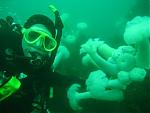In another post BamaCaveDiver brought up something that I thought would make a great discussion. He said Plan Your Dive & Dive Your Plan. That is something I have heard before, but don't know much about.
So what does it mean exactly to Plan Your Dive & Dive Your Plan? I know it sounds obvious but I need to know what it really means in black and white. I also want to know why you feel it is important or not important.
Ace






 Reply With Quote
Reply With Quote





